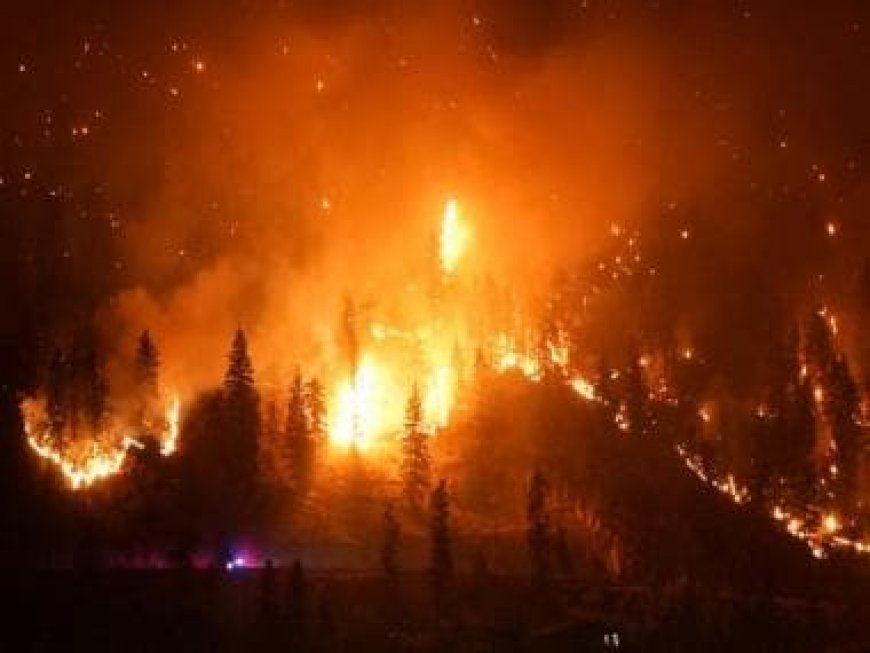Canada's firefighters wage epic battle to save communities after mass evacuations
Canada's firefighters wage epic battle to save communities after mass evacuations

Firefighters battling wildfires in western Canada received reinforcements and better weather Saturday, after the country’s worst fire season on record damaged houses, polluted the air with dense smoke, and forced tens of thousands of Canadians to evacuate.
Flames were kept at 15 kilometres (9 miles) from Yellowknife, the capital of the Northwest Territories, while exhausted firefighters were given a break in the area near Kelowna, British Columbia. But, with drier and windier weather anticipated for the next few days, the firemen were far from claiming triumph.
“We’re by no means out of the woods yet,” Mike Westwick, wildfire information officer for Yellowknife, told The Associated Press. “We still have a serious situation. It’s not safe to return.”
According to the Canadian Press, the flames in Kelowna, some 90 miles (150 kilometres) north of the US border, are among more than 380 blazes across the province, with 150 burning out of control. In the Northwest Territories, there are 236 active fires.
Shane Thompson, the province’s minister of environment and climate change, said at a press conference Saturday evening that the flames near Yellowknife had not developed significantly in the last several days due to weather interruptions.
“But I want to be clear, a little bit of rain doesn’t mean it’s safe to come back home,” he said. Others warned that incoming hot weather would make the battle more challenging.
Yellowknife Mayor Rebecca Alty encouraged residents to stay away from the town to ensure their safety and help with firefighting efforts. She assured people that patrols were monitoring the streets and homes to protect against looting.
“This fire’s taking a nap. It’s going to wake up and we still got a serious situation to handle here,” Westwick said.
Yellowknife has been a virtual ghost town since a majority of the city’s 20,000 residents started to flee following an evacuation order issued Wednesday evening, officials said. Long caravans of cars choked the main highway for days and those who couldn’t take to the road lined up for emergency flights out of the city. The last 39 hospital patients were flown out Friday night on a Canadian Forces plane, officials said.
On Saturday, officials said the escape route out of Yellowknife was safe, for the time being. About 2,600 people remained, including emergency teams, firefighters, utility workers and police officers, along with some residents who refused to leave.
Charlotte Morritt was among those who left Thursday, reaching that decision because of the unbearable smoke that she feared would be unhealthy for her 4-month-old son.
Morritt, a journalist with the Aboriginal Peoples Television Network, and her son took an evacuation flight some 1,500 kilometres (950 miles) west to safety in Whitehorse, Yukon, while her partner stayed behind to monitor their property and help create firebreaks and fight fires.
“We knew it was only a matter of time,” said Morritt, who had been following media updates and satellite images of the approaching wildfires.
Air tankers dropped water and fire retardant to keep the flames from Yellowknife. A 10-kilometre (6-mile) fire line was dug, and firefighters deployed 20 kilometres (12 miles) of hose and a plethora of pumps.
Canada has seen a record number of wildfires this year that have caused choking smoke in parts of the US All told, there have been more than 5,700 fires, which have burned more than 137,000 square kilometers (53,000 square miles) from one end of Canada to the other, according to the Canadian Interagency Forest Fire Centre.
All of British Columbia was under a state of emergency on Saturday. About 35,000 people have been ordered to evacuate wildfire zones across the province and an additional 30,000 people were under an evacuation alert, meaning they should be prepared to leave, Premier David Eby announced.
Eby told reporters Saturday that the situation was “grim” and warned that the “situation changes very quickly.”
He said he was restricting non-essential travel to fire-affected areas to free up accommodations such as hotels, motels and campgrounds for displaced residents and firefighters.
Ian Stewart and his wife made the “anxiety-producing” decision Friday to evacuate Kelowna with their 4-year-old border collie and drive 335 kilometres (210 miles) to the British Columbia town of Clearwater.
“The smoke was really oppressive and there were big chunks of ash falling everywhere,” he said Saturday. They packed a couple of suitcases, passports, laptop computers and dog food, and drove in bumper-to-bumper traffic to escape.
A shift in the wind carried smoke and haze from British Columbia into the Seattle area on Saturday, said Dustin Guy, a meteorologist with the National Weather Service. The Puget Sound region was just recovering from record heat, and air quality could reach unhealthy levels Saturday night through Monday, Guy said.
Prime Minister Justin Trudeau, who met Friday with some of the Yellowknife evacuees who travelled south to Edmonton, Alberta, on Saturday shared on X, the social media platform formerly known as Twitter: “We’ve got your back.”
Trudeau praised firefighters, police, military personnel, the Red Cross and others who responded to the fires and other natural disasters this summer.
“Terrible loss, increased extreme weather events. And all through it, we’ve seen Canadians step up,” he told reporters in Edmonton.
What's Your Reaction?



























































